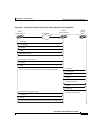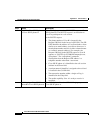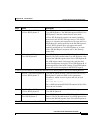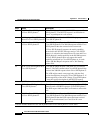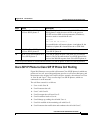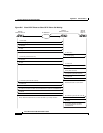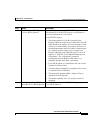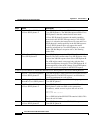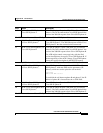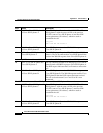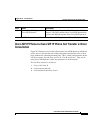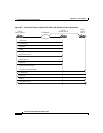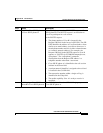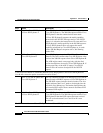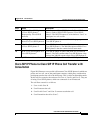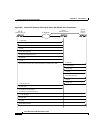
B-29
Cisco SIP IP Phone 7960 Administrator Guide
78-10497-02
Appendix B SIP Call Flows
Call Flow Scenarios for Successful Calls
9
ACK—Cisco SIP IP phone B to
Cisco SIP IP phone A
Cisco SIP IP phone B sends a SIP ACK to Cisco SIP IP
phone A. The ACK confirms that Cisco SIP IP phone B has
received the 200 OK response from Cisco SIP IP phone A.
The RTP channel between Cisco SIP IP phone A and Cisco SIP IP phone B is torn down.
10
200 OK—Cisco SIP IP phone B
to Cisco SIP IP phone C
Cisco SIP IP phone B sends a SIP 200 OK response to
Cisco SIP IP phone C. The 200 OK response notifies Cisco
SIP IP phone C that the connection has been made.
11
ACK—Cisco SIP IP phone C to
Cisco SIP IP phone B
Cisco SIP IP phone C sends a SIP ACK to Cisco SIP IP
phone B. The ACK confirms that Cisco SIP IP phone C has
received the 200 OK response from Cisco SIP IP phone B.
The ACK might contain a message body with the final
session description to be used by Cisco SIP IP phone B. If
the message body of the ACK is empty, Cisco SIP IP phone
B uses the session description in the INVITE request.
A two-way RTP channel is established between Cisco SIP IP phone B and Cisco SIP IP phone C.
12
INVITE—Cisco SIP IP phone B
to Cisco SIP IP phone C
Cisco SIP IP phone B sends a mid-call INVITE to Cisco
SIP IP phone C with new SDP session parameters (IP
address), which are used to place the call on hold.
Call_ID=2
SDP: c=IN IP4 0.0.0.0
To establish the call between phone B and phone C, the IP
address of phone B is inserted into the c= SDP field.
13
200 OK—Cisco SIP IP phone C
to Cisco SIP IP phone B
Cisco SIP IP phone C sends a SIP 200 OK response to
Cisco SIP IP phone B.
14
ACK—Cisco SIP IP phone B to
Cisco SIP IP phone C
Cisco SIP IP phone B sends a SIP ACK to Cisco SIP IP
phone C. The ACK confirms that Cisco SIP IP phone B has
received the 200 OK response from Cisco SIP IP phone C.
The RTP channel between Cisco SIP IP phone B and Cisco SIP IP phone C is torn down.
Step Action Description



